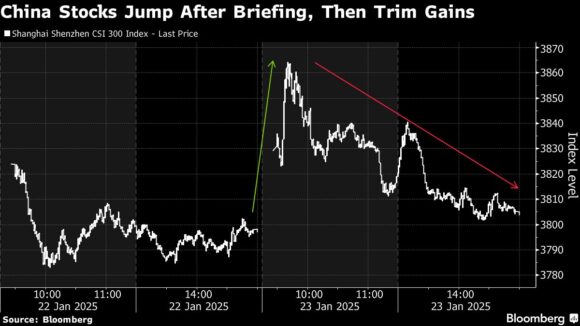China is guiding local mutual funds and insurers to boost their stock purchases in the government’s latest initiative to shore up its ailing equity market as it confronts the threat of higher tariffs.
Mutual funds should raise their holdings of onshore equities by at least 10% annually for the next three years, while large state-owned insurers will need to invest 30% of their new policy premiums from 2025, Wu Qing, chairman of the China Securities Regulatory Commission, said at a press conference on Thursday.
China’s benchmark CSI 300 Index rose as much as 1.8% in early trading as the announcements were made, before later paring gains to close up just 0.2%. The Hang Seng China Enterprises Index, which tracks mainland stocks listed in Hong Kong, was trading down 0.5%.
“This policy is quite beneficial to Chinese equities, especially for those state-owned enterprises stocks with high dividend yields,” said Jason Chan, senior investment strategist at Bank of East Asia in Hong Kong. Still, the measures are aimed at stabilizing the equity market, instead of giving a very large boost, which would need more catalysts from fiscal stimulus, he said.
China will commence the second stage of a trial program for insurers’ long-term equity investments in the first half of this year, with an amount of at least 100 billion yuan ($13.7 billion), Wu also said at the briefing.
Furthermore, the government is planning to make some changes with a view to giving state-controlled insurers more flexibility in managing their long-term investments, Vice Finance Minister Liao Min said at the event.
Insurance stocks jumped on speculation their investment returns will increase if they follow the government’s guidance for long-term funds to boost holdings in the local market. A Bloomberg gauge of Chinese insurer firms listed in Hong Kong rose 2%.
Chinese shares have been under pressure in recent months amid fears over a prolonged economic slowdown and the threat of higher tariffs by new US President Donald Trump. Traders have grown increasingly disappointed at Beijing’s piecemeal stimulus efforts and have questioned the potency of the measures introduced so far.
Concerns about the economic malaise and escalating trade tensions caused the MSCI China Index to enter a bear market this month. The CSI 300 Index had dropped 3.5% this year through Wednesday, putting it among the worst performers in Asia.China on Wednesday had rolled out a basket of measures to stabilize its stock markets, including plans to boost the amount pension can invest in the nation’s listed companies. The central bank in September said would set up a swap facility allowing securities firms, funds and insurance companies to tap liquidity from the central bank to purchase equities.
The CSI 300 Index snapped a four-day winning streak on Wednesday after Trump said his threat to impose 10% tariffs on Chinese goods was still being considered and may take place next month.
Friday’s announcements are “incrementally positive for the A-share market but not a game changer,” said Gary Tan, a portfolio manager at Allspring Global Investments. “We expect the high dividend domestic names to benefit more from these flows.”
Photograph: The Bund Financial Bull in Shanghai, China; photo credit: Qilai Shen/Bloomberg
Copyright 2025 Bloomberg.
Topics
Carriers
China
Interested in Carriers?
Get automatic alerts for this topic.
